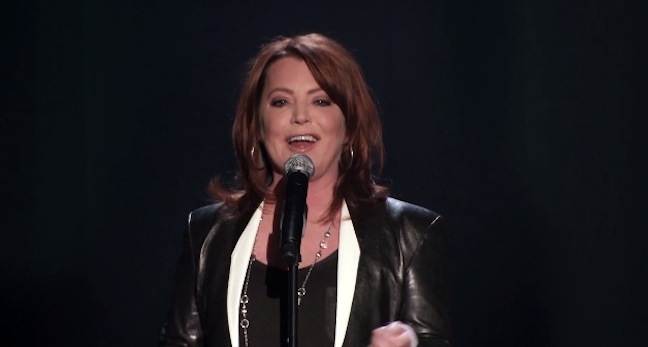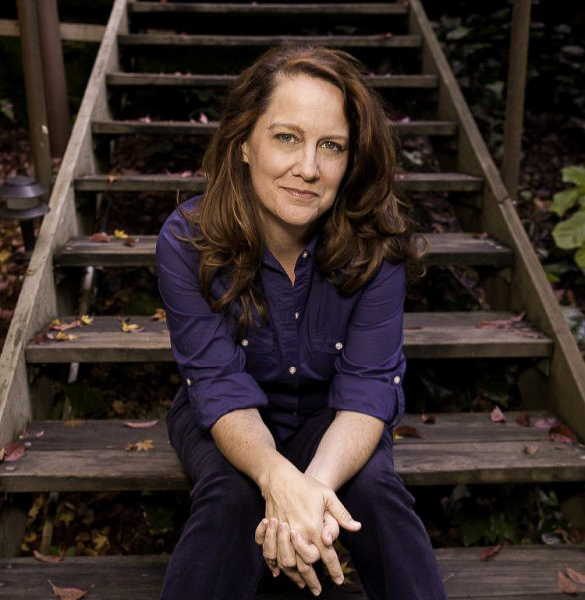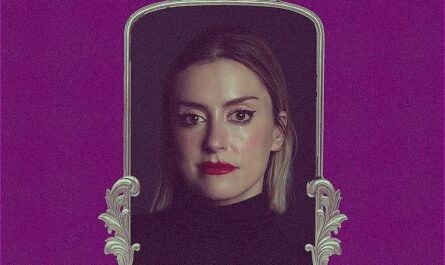Kathleen Madigan opens her latest stand-up comedy special, “Madigan Again” in Detroit first with Lewis Black by her side on a street in front of the Monument to Joe Louis, then a minute later onstage being introduced by Black. To which she responded, in kind: “How about one big hand for a guy working for $500 tonight!”
Madigan’s friendship with Black comes up again at the tail end of the hour, in which she recounts her first (and potentially last) trip aboard a cruise ship to perform with him. She pays the kindness forward to other comedians, as she told The Comic’s Comic in an interview this month to coincide with the release of “Madigan Again” in physical and digital audio/video formats (it premiered earlier this year via Netflix).
As a DVD, it’s pretty no-frills (no bonus featurettes or extras), but then again, Madigan is a no-frills kind of gal from a no frills family. Always has been. Focusing on the job of stand-up and being a solid professional at it. She drinks. She smoked (until recently). She just rejoined a gym but would rather still hang out in the bar, joking, “I’ve never stayed at a gym so long I got kicked out.” Younger people may enjoy horror movies, but only because they’re neither old nor wise enough to be horrified by the real world just yet — as she explains in this clip.
She keeps her comedian friends close and her Democratic Irish Catholic family from St. Louis closer (even if, as she spoke with The Comic’s Comic, she was set to sign paperwork to help her parents make the big move to Florida).
In “Madigan Again,” she confesses her love of Twitter, believing that any good thought should and has been boiled down to 140 characters already. But in my interview with her, she also acknowledged that in other respects, she remains hopelessly behind on technology. Not that that bothers her at all.
“I don’t even know how to record my sets on my phone,” Madigan said.
Even 25 years into her career, at a point when she can choose where and how she records her stand-up for sale, her personal recording device is a Sony Minicassette recorder. “I did Letterman a couple of months ago,” she said. “This guy, Ryan…he went to Fallon now…he asked me to send him a link (to her stand-up).” Nope. Not going to happen. Didn’t happen. “What would be really funny is if I sent him my minicassette, and say, ‘You can buy a player at Walgreens if they have one left, I can mail you mine but you have to mail it back.'”
There’s a method to this particular madness for Madigan, staying analog in an increasingly digital world.
“If I have the digital one and then I can put it in my Mac, I will never listen to them. I have two tapes, but in order to record over the shit, I have to listen to this shit. That’s part of the trick of only buying two tapes. It works for me. If it was a digital thing, they could pile up, and then I’d never look at anything.”
Having so much information at your fingertips isn’t preventing media people from asking her questions they could look at to find the answers, too, anyhow. “Sometimes two out of three (interviews) are great. And then one, it’s just ‘Wow,'” she says, citing as an example, a question that’s sometimes posed to an opera singer: “I’ve noticed most of you guys are on the chubby side. Is that necessary or are you just chubby? That’s how fucked up the questions are. What I do to make it less shocking, I email what’s being said to me to Lew and then he responds.”
“It really has become lazier. What counts as a media outlet?” Madigan sometimes has to ask her publicists if the organization is real. “Sometimes I just think I’m talking to a jackass in a basement.” If that’s the case, why not turn the tables? “I’d like to talk to Stevie Nicks. Can I just call and say, ‘I’m Kate Madigan of The Kate Madigan Examiner?”
Truth is, Madigan did start out in journalism herself. Writing for a magazine for the Missouri Athletic Club. “They had 5,000 members or so they said. I did their magazine from cover to cover. It was the softest journalism that I could ever imagine. I was fine with that. But I was making no money. I was bartending at night. I liked that so much better.” Though not as much as telling jokes, which she began doing after watching other comedians in St. Louis.
She saw what they did and knew anything they could do, she could do better. Same could be said for writing a book, if only the desire was there on her part. Publishing houses and lit agents have asked her to pitch a book. “Lew loves it. He goes to North Carolina and locks himself in to write. I couldn’t handle one day of that. I’d be at the bar, saying, ‘What’s going on here?'”
Some stand-up comedians say they still do the road and work because they cannot imagine holding down any other kind of job. Or that they need to tell jokes. Is that how you feel? “I have no need to do this,” Madigan says. “I wonder if I’m too old to go and become an FBI profiler. I like comedy and I’m thankful that it comes easy to me. But I’ve been off for two weeks. That’s fine. I’m like, ‘Why do I have more shows before Christmas? I’m already in holiday mode. What do you mean I have to do radio? I think I could be a Realtor.
“There are people who have a need to do it, i just don’t. Whatever it is inside a person that makes them want to be extremely famous or extremely wealthy, I don’t have that, either.”
She said TV networks and studios also approached her in recent years about joining a daytime talk-show panel. Not for her. “I don’t want to go to work everyday,” she says.
So how did you get talked into doing Last Comic Standing? “That wasn’t an everyday thing. That was just a project. Like when Lewis did Root Of All Evil, I could write for these, produce these. That was a project. I knew there was an end point…and it was loose. Lew’s the boss. Whatever Lew.”
So when you hear about Last Comic Standing returning in 2014, what would you advise stand-ups who are considering it? “I don’t think those of us who had to live in the house are the correct people to ask. It’s like asking those of us who went to Vietnam … You left with your friends thinking it was going to be this and this and that. The producers twisted and mangled everything to points that were just unrecognizable. I will never do any reality TV ever again based on that experience.”
“The big production that does Little People, Big World … they have chased me around for two years, ‘We want to do your family.’ I say no. They think I’m bargaining. No. I have no wishes. Stop calling me!”
By releasing “Madigan Again” on Netflix first, you are still staying relevant or up-to-date on trends and how comedians relate to audiences in 2013. Do you feel pressured to do more offstage since everyone else is with podcasts, webseries, vlogs, and social media, when a decade ago, it was going onstage and then maybe selling merch afterward?
“I feel worse for the people behind us, because there’s no focus anymore. Lew and I call this the gray area. There’s people watching network, there’s people watching cable, it’s so split up and divided.
“If you go all the way back to (Johnny) Carson, there were only three networks to watch, and two-thirds of them watched Carson. You just got the attention. There’s no way to do that today unless you shot people, or blew something up. Everything is so splintered and fractured. It’s appealing to a certain demographic. I just read Sarah Palin got another show, she’s hosting on The Sportsmen Channel. I’ve never heard of that channel. When I looked it up, I saw they’re reaching 24,000 viewers. Yeah, you got a TV show, but what does that mean anymore?”
“Now there’s literally 900 channels. I think it’s more difficult for people now.”
“The good thing is I already had enough of a fanbase, they’ll go with me (to Twitter, or to Netflix). I don’t know how you build a fanbase if you can’t find your people. There is no focus anymore. I guess they have to find a different model. I’m not even a businessperson and I can’t believe I just used the word model. I know exactly what to do to get to my people. I don’t think I’m gaining any new people because of Twitter.”
To the younger comics with an active online presence, she’d say: “I would also say to most of them stop that shit and just tell jokes every night. And then live your life. Look at your video on YouTube. It has 306 views. I have 300 people in my family. I think it’s just a distraction that’s not worth the time. At least the video’s there for someone to look at. The Facebook postings, you’re already talking to the people who like you.”
As for Madigan, she has kept friendships with comedians such as Black from her earliest years and nights on the road. That’s real-life networking. “That’s the other thing with the road. I can’t explain this thing to comedians because it’s exhausting all of my energy. I’ve lived in hundreds of comedy condos with Ron White and Bill Engvall and Lew. They’ve all been headliners. And then they just become your friends. I don’t become friends with people who aren’t funny with the exception of a few. If you’re not on the road, you’re not really building relationships with these people. New York and L.A., its all too competitive.”
Would you still approach your career the same way if you were starting today? “I’d do it the exact same way. Because I don’t think there is any other way. The only thing you can’t do is open on the road in the clubs because nobody is paying for that. I wasn’t a fan of them (then) but I’d do the college gigs, because that is going to pay the rent… You’re going to have to sell merch… It’s not the same farm system exactly because that system doesn’t exist anymore… Go middle at Zanie’s in Nashivlle… If you get your CD on Sirius radio, that’ll pay a little extra…
Where did that comedy club farm system go or disappear off to? “I think clubs realized, why will we pay an out-of-town feature several hundred bucks?” So they stopped doing that and replaced them with cheaper, less experienced local stand-ups. “I think the clubs went down a notch, too… because the economy changed… and the economics… you’d have to look into it. It’s a thesis paper. The money was there and all of a sudden it wasn’t anymore. I would argue it was because you booked shitty acts. And your reputation went down. I think a club can be run successfully and you can do it the old way.”
For her part, Madigan doesn’t use a regular feature act on the road. “I try to get headliners that have nothing to do that are either in that area or I’ll pay to fly them. If I can’t get headliners, I’ll go with middles. I’d like to get new people, but people who have paid to see me, $5 to $45 dollars, its not fair for them to have to see new people.” So she doesn’t force them to. Such as having Lewis Black open for her on her special taping in Detroit for $500. “I’m amazed to see who will do it,” she says. “Even Vic Henley. Vic was headlining when I was an opener. I’ll call him and say, ‘I’m doing Jersey, can you take the train? And then I’ll have people who do 25 minutes, you don’t have to sit through a shitty opener. You get a bonus.” So does the headliner who features for her. “Then they can take the weekend off and come play and still make some money. I can’t pay that much, but I can pay enough to make it sound fun.”
A couple of hours with Madigan and her friends almost always is.
Kathleen Madigan, “Madigan Again,” available for viewing on Netflix, or in CD and DVD forms.
movie: mp3:
CD: DVD:




One thought on “No frills, just funny: Kathleen Madigan talks “Madigan Again,” her 2013 stand-up special”
Comments are closed.